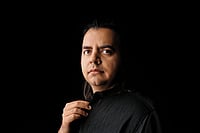Between 2018 and 2019, Droom, an online automobile marketplace run by Sandeep Aggarwal, made headlines for its international expansion to Southeast Asian countries.
“I had a very strong desire to create a consumer internet brand that is truly global,” says Aggarwal. An unlikely entrepreneur, Aggarwal spent his formative years in the villages of Haryana, went to a Hindi-medium school, flew off to the US for graduation and became a Wall Street analyst with an annual salary of $1 million. In 2010, he decided to come back to India to become an entrepreneur, started ShopClues and built it into a unicorn that competed with Flipkart and Amazon, later got embroiled in an insider trading case in the US, got ousted from ShopClues by the same investors who loved him and went through a bitter divorce. He, however, decided to start all over again to build Droom.
There are two sides to the Sandeep Aggarwal story: one of true grit and the other of overconfidence, which comes from his power to overcome his failures. Therein lies the real story of his mistakes and redemption.
Droom’s international expansion, however, will have to wait despite being flush with fresh capital from a recent $200-million funding round that gave the company an entry into the coveted unicorn club.

Aggarwal—the only Indian startup founder to build two unicorns (ShopClues isn’t part of the club anymore) in a decade—is now taking Droom to the bourses.
But, did he get carried away to build a global company? “Being a second-time founder has its own drawbacks,” he says. “You take a lot more on yourself, which you would not do as a first-time entrepreneur.”
A Call from Friedman
“In hindsight, it feels that we were slightly early going international,” says Aggarwal, who doesn’t want to repent for doing what he did. “While someone can look at the glass half empty, I look at the glass half full.”
For a perspective on Aggarwal, you need to get on to the calendar of Chaim Friedman, an angel investor and co-founder of Starlims (acquired by healthcare major Abbott for $123 million in 2010).
Aggarwal met Friedman when Starlims was getting listed on Nasdaq in 2007. Three years later, when Friedman started investing, he called Aggarwal to ask if he had thought of entrepreneurship. The call was coincidental: Aggarwal was thinking of starting ShopClues after quitting his job as a Wall Street analyst.

In Friedman’s words, Aggarwal’s India-versus-global focus shows how fast he learns from his mistakes and how well he navigates between two promising alternatives of India and the world, but does so with a “large body of data and analytics”. Aggarwal, Friedman explains, has the ability to focus attention and resources on what really drives growth.
Coming from a Wall Street background, Aggarwal loves numbers. He says that despite being valued at $1.2 billion, Droom owns just 0.5-0.6 per cent market share in auto. “We are a hyperlocal marketplace and we just need to go slightly deeper,” Aggarwal adds.
“The fresh capital can grow Droom’s market share by three to four times,” says a confident Aggarwal. But he wasn’t always this confident.
Reinventing Sandeep Aggarwal
If you met Aggarwal in 2014-15, you would not believe that he could build another unicorn. He was miserable, full of self-pity and self-doubt after his ouster from ShopClues. “I was in trauma for 14 months,” Aggarwal says.

Two years before that, in 2013, Aggarwal was booked for insider trading and arrested by the US Federal Bureau of Investigation (FBI). “My legal case was so high-profile and criminal in nature that investors had to think about the reputational risk (from association),” says Aggarwal.
Aggarwal pleaded guilty and had to step down from the CEO post at ShopClues and become its consultant. His lawyer, Steve Kobre of New York-based law firm Kobre and Kim, while stepping out of the federal district court in the Southern District of New York, told Aggarwal, “Please hire a mental health specialist and enjoy the smell of the roses you have already planted, but don’t think of planting new roses.”
Aggarwal became a recluse because of the lost opportunity. “I feel ShopClues could have been a $15-20-billion asset if I did not have my legal case, and if I were still running it,” he says.
For two years, Aggarwal lived in self-doubt. The grit and conviction, so characteristic of him, had vanished. Investors and the media judged him harshly, too. “Investors liked me and my company, but did not invest.… Second-guessing myself was a mistake, especially when I was building something (Droom) that was not apparent (in its business model),” says Aggarwal. “Eighty per cent of Indian unicorns are either American or Chinese replicas. Droom is not one of them.” Despite this knowledge, Aggarwal was looking for validation.
Some, like investor Chaim Friedman, believed in him. Teruhide Sato, founder and CEO of Beenext, and Sid Talwar of Lightbox Ventures, too, stood by him. All three invested in Droom.
After that, he slowly found his way out of the funk and began to make bolder bets.
But he knows wallowing in self-doubt means he lost precious two years.
2016 was a defining year for Droom to build an ecosystem of services around used car buying.
The Fortress and its Moat
On the outside, Droom is a company that deals in old and new vehicles. Under the hood, however, is a cluster of products, especially designed for a country like India, that acts as a moat around the fortress.
India’s used car market—the third largest in the world—is highly fragmented, mostly run by neighbourhood dealers. When Droom started in 2014, there were many competitors—mostly online classifieds—like Carwale, CarDekho, OLX and Quikr, among a dozen others. Aggarwal wanted to build Droom around trust and credibility, both for the buyer and the seller.
In March 2016, Droom launched Eco, a vehicle inspection tool, and in August, Orange Book Value, a used vehicle price determination engine. “Eighty-five per cent of the cars sold in this country have a tampered odometer, and the seller has an incentive to conceal the truth and mislead you to get a better price,” says Aggarwal. Other ecosystem products such as History (to track record of used vehicles), Discovery (a used case search engine) and Credit (for auto loans and dealer financing) followed. Coming soon is Droom Velocity, a last-mile delivery service that will deliver the car to your doorstep—just like in ecommerce.
Mission Hills to Mission India
Before its India recalibration, Aggarwal was itching to take Droom international, mostly because he had seen the global opportunity during his time in the US.
There is nothing wrong with global ambitions, but the India story has become more important. Before COVID-19, Aggarwal opened offices in Singapore, Thailand and Malaysia. “We had to rethink that,” he says.
During the pandemic it was important to conserve capital as liquidity had hit the floor. Travel, too, stopped, which made running international operations less viable.
COVID-19 helped Aggarwal refocus on India. Every day, more than a quarter of a million automobiles—old and new bikes and cars—are sold in India. Droom sells only 300 of those. “With such low penetration, the sky’s the limit,” he says.
If Droom has to become a $50-billion company in the next decade, 60 per cent of that value would come from India, he adds. With only 0.7 per cent of the automobile market, almost entirely driven by used car buying, being online, the opportunity is massive.
While macroeconomic data has shown the resilience of consumption in India, the pandemic has advanced digital adoption by a couple of years. “That made us invest more heavily in India,”
Aggarwal says. The change is visible as Aggarwal concentrates on taking Droom to the bourses.
Droom is India’s largest online automobile marketplace with 1.1 lakh active listings worth $16 billion. But Droom was never meant to be and Aggarwal had never thought of becoming a serial entrepreneur. “I wanted to retire from ShopClues,” he says.
Droom was the result of an unfulfilled desire to build a global consumer internet company. “I am an accidental serial entrepreneur,” says Aggarwal.































